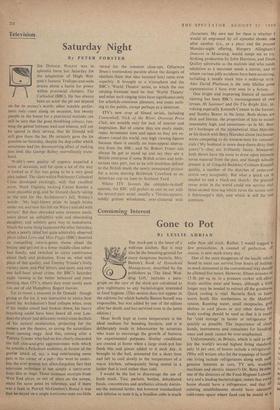Television
Saturday Night
By PETER FORSTER
SIR DONALD WOLF IT was in splendid form last Saturday for
the adaptation of Hugh Wal- pole's famous Trollope-and-soda drama about a battle for power within provincial cloisters, The Cathedral (BBC). He has always been an actor the pit can depend on for its money's worth; other notable perfor- mers may coast along on occasion, but twenty people in the house for a provincial matinee can
still be sure that the great throbbing vibrato, run-
ning the gamut between wail and wheeze, will not be spared in their service, that Sir Donald will still give them the lot. He certainly gave the lot possible on Saturday, despite the dog-collar which sometimes had the disconcerting effect of making him look like George Robey marvellously trans- lated.
Wolfit's own quality of urgency imparted a sense of occasion, and for quite a lot of the way it looked as if this was going to be a very good play indeed. The clash within Polchester Cathedral Close developed excitingly, with that excellent actor, Mark Dignam, making Canon Ronder a most plausible prig, and Sir Donald clearly taking as the text for the Archdeacon's fall, Wolsey's words: 'My high-blown pride At length broke under me, and now has left me Weary and old with service.' But then obtruded some tiresome mech- anics about an unfaithful wife and absconding daughter, and subtlety gave way to melodrama. Much the same thing happened the other Saturday, when a poorly titled but quite admirably observed piece called Love and Miss Figgis (BBC) deserted its compelling corn-is-green theme about the brainy odd girl out in a lower-middle-class subur- ban family, and switched to corny contrivance about theft and probation. Even so, what with plays of this quality, and Tommy Trinder's lively variety show, and Phil Silvers, and sport, and only one half-hour about crime, the BBC's Saturday night viewing is far better balanced and more inviting than ITV's, where they must surely soon run out of old Humphrey Bogart movies.
Yet to revert a moment to Sir Donald : though giving us the lot, it was instructive to notice how (until the Archdeacon's final collapse when, even if the studio sound had broken down, his heavy breathing could have been heard all over Lon- don) the player had delicately muted some decibels of his natural exuberance, projecting for the camera not the theatre, so saving the naturalism from seeming stagy. And this, coming after a Tommy Trinder who had no less clearly discarded the full chin-and-grin aggressiveness with which he assaults a Palladium audience, in favour of the gentler attack of, say: a wag entertaining some pals in the corner of a pub—this went to under- line the ever-present but often-forgotten fact that television technique is not simply a carry-over from film or stage. Those incessant excerpts from West End plays, so out of place on the screen, make the same point by inference, and if there was a fault in Patrick McGoohan's Brand it was that he stayed on a single fortissimo note too little varied for the constant close-ups. Otherwise Ibsen's tremendous parable about the dangers of idealism (how that idea haunted him) came over superbly. It brought to a triumphant end the BBC's 'World Theatre' series, to which the one carping footnote need be that 'World Theatre' and other such ringing titles have significance only for schedule-conscious planners, and mean noth- ing to the public, except perhaps as a deterrent.
ITV's new crop of filmed serials, including Cannonball, Nick of the River, Overseas Press Club, are notable only for lack of interest and inspiration. But of course they are easily made; repay investment time and again as they are re- shown round the world; rate high viewing figures because there is usually no mass-appeal alterna- tive from the BBC; and Sir Robert Fraser can always be got to stand up and say they are a British enterprise if some British actors and tech- nicians take part, just as he will doubtless defend to the British death the newly announced project for a series starring Broderick Crawford as an American cop on loan to Scotland Yard.
Where ITV favours the complete-in-itself episode, the BBC still,prefers to cast its net with the several-part serial, usually a Thirties-pattern, mildly genteel whodunnit, over-cluttered with characters. My own test for these is whether I would sit engrossed by all episodes shown one after another (i.e., as a play) and the present Monday-night offering, Margery Allingham's Dancers in Mourning, would tempt me to try. Striking production by John Harrison, and Denis Quilley admirable as the matinee idol who needs adulation as a narcissist needs a mirror, and to whom various jolly accidents have been occurring, including a needle stuck into a make-up stick. Also David Phethean is the only lifelike press representative I have ever seen in a fiction.
One bright and improving feature of summer viewing has been BBC's encouragement of two revues, Hi Summer! and On The Bright Side, in- volving especially Kenneth Connor in the former, and Stanley Baxter in the latter. Both shows are slick and literate, the proportion of hits to misses reasonably high, and sometimes—as in Mr. Bax- ter's burlesque of the alphabetical Alan Melville, or his sketch with Betty Marsden about two house- wives competing to do window-tests for commer- cials ('My husband is more deep-down dirty than yours!')—they are brilliantly funny. Moreover, both shows have the sense to draw upon intimate revue material from the past, and though nobody present is of Gingold-Baddeley-Crisham-Kendall quality, a number of the sketches of yesteryear revive very acceptably. But what a quick cut is needed to end a black-out sketch : the greatest revue artist in the world could not survive that three-second time-lag which turns the screen into a fishmonger's slab, and which is still far to common.


































 Previous page
Previous page